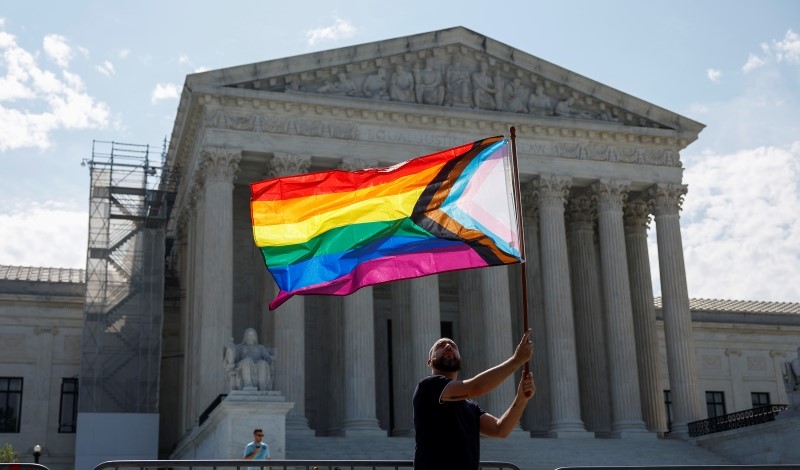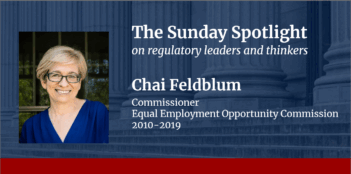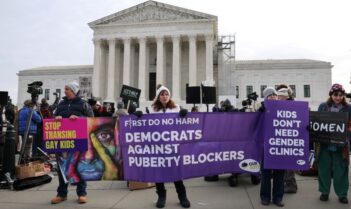
The incoming Trump Administration threatens the current constitutionality of same-sex marriage.
The results of the 2024 national election have raised concerns among many married same-sex couples about the legal status of their relationships going forward. Those concerns are warranted. Although it is unlikely couples will be in immediate danger of losing their rights after the new Administration and Congress take power, the current composition of the U.S. Supreme Court already puts those rights on uncertain footing and the election results may embolden hostile actors looking for opportunities to target gay couples.
The constitutional right of same-sex couples to marry remains good law under the 2015 ruling of Obergefell v. Hodges. It seems likely a majority of the current Supreme Court would not have supported that ruling, however, and the Court’s 2022 decision in Dobbs v. Jackson Women’s Health Organization overruling Roe v. Wade and Planned Parenthood v. Casey gives reason to worry that the Court will also refuse to respect Obergefell as precedent.
While the Court is not going to get any better for marriage equality in the next four years, the breakdown of votes on this issue probably will not change any time soon. Supreme Court Justices Clarence Thomas and Samuel Alito may step down to give a Republican President the opportunity to replace them but whatever else those appointments would represent they cannot get any less favorable on marriage equality than Thomas and Alito.
Chief Justice John Roberts, who dissented in Obergefell, nonetheless voted to apply and enforce that ruling in a 2017 case involving birth certificates for the children of married same-sex couples, perhaps indicating he has accepted Obergefell as precedent despite his disagreement with it. Justice Gorsuch joined Justices Thomas and Alito in dissent in that case. The danger that Obergefell will be overruled will probably not get materially worse until the Chief Justice steps down and that is not likely to happen soon.
That said, the danger is already real. If Justices Amy Coney Barrett and Brett Kavanaugh have set their sights on marriage equality then the conservative majority probably already has the votes to overrule Obergefell and it is possible the election results will prompt them to act. While any appointments to the Court that may happen in the next four years will probably not hasten the overruling of the constitutional right of same-sex couples to marry, those couples must already treat the scenario as a serious prospect.
If the right-wing Justices do overrule Obergefell they will impose immediate consequences for the right to marry in states around the country. Any state laws still on the books that prohibit same-sex couples from marrying would snap back into effect, just as old abortion laws did following Dobbs. State laws do not get struck from statute books or state constitutions when they are found unconstitutional; they simply become unenforceable. With the exception of statutes found invalid under state constitutions, all such existing provisions would go back into effect. At the very least, this would mean same-sex couples could not get married going forward in anti-marriage states.
What would happen to same-sex couples who had previously gotten married in those hostile states? That is a complicated question. There are very good reasons not to invalidate existing marriages in this scenario based on long-standing due process concepts of reasonable expectations and vested rights. But many hostile states used aggressive language in their anti-marriage provisions that might be construed to do exactly that, declaring the marriages of same-sex couples to be “void,” “absolutely unenforceable” or a “nullity.” These questions would have to be litigated in every affected state. It would be a mess.
Congress enacted a federal statute in 2022, the Respect for Marriage Act (RFMA), that will provide some help to same-sex couples in this scenario, but that help may be less robust than people assume.
The RFMA does not guarantee a right to marry. Congress probably does not have the power to enact marriage equality by statute in a post-Obergefell world. Instead, the statute does two things that are important but more limited. It provides that couples who are validly married under state law will have their marriages recognized for federal purposes; and it prohibits states from discriminating against same-sex couples in situations involving state-to-state recognition. If a couple lives in New York, gets married there, then subsequently moves to Texas, the RFMA guarantees federal recognition of their marriage and bars Texas from refusing to recognize that legal relationship simply because they are a same-sex couple.
Important as these protections are, their scope and robustness remain uncertain. The most consequential disputes under the RFMA are likely to involve disagreements over the types of state and local policies the statute will recognize as prohibited discrimination. Imagine a couple who lives in Texas goes to New York for the weekend, gets married, then returns to Texas and asks to have their marriage recognized. That couple may not be able to claim RFMA’s protection. They are being denied recognition because they are a same-sex couple in this scenario, but they also acted to evade the restrictions of the place in which they are domiciled when they traveled out of state to get married. The RFMA may allow states to continue using established conflict-of-laws doctrines to deny recognition to some marriages even if the impact would fall most heavily on same-sex couples and “evasive” marriages of this kind may fall into that category.
There are also arguments that the RFMA will provide greater protection. If a state suddenly starts using conflict-of-laws doctrines it previously ignored as a pretext for targeting same-sex couples, for example, that might well constitute prohibited discrimination in violation of the Act. And the statute could be read to support disparate impact claims of a type already recognized under other federal civil rights laws. Lack of clarity on these questions will force couples to cope with significant uncertainty if Obergefell is overruled.
Opponents of marriage equality can also be expected to challenge the constitutionality of the Act’s full faith and credit provisions in such disputes since Congress has never enacted a law like the RFMA. Article IV of the U.S. Constitution gives Congress the power to enact “general laws” to “prescribe . . . the effect” of state “acts, records and proceedings” in interstate disputes. Nothing should prevent Congress from using that broadly worded power to prohibit discrimination in full faith and credit just as Congress has used its commerce power to prohibit discrimination in employment and housing. But the current Supreme Court has upended many settled doctrines in recent years and it is difficult to predict what the current majority would do with these challenges.
Same-sex couples would do well to seek advice about how to protect themselves and their families, either from competent family-law attorneys or from LGBTQ organizations like the National Center for Lesbian Rights. The danger to their marriages will probably not be greater immediately following January 20, 2025 than it is right now but that danger is already real and it may increase. Local officials in states that are hostile to marriage equality may be more eager to defy settled law and provoke confrontations after the new Administration begins with the expectation that they will be able to do so with impunity. The rights of same-sex couples will probably depend on whether Justice Barrett chooses to respect precedent and whether Chief Justice Roberts sticks to his decision in 2017 to treat marriage equality as settled law. If either Justice decides instead to treat marriage equality the way the Dobbs majority treated abortion, same-sex couples around the country will live in a state of legal precarity.




